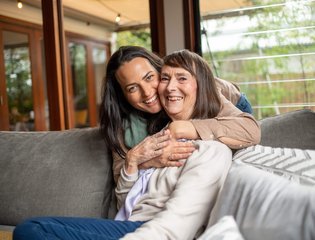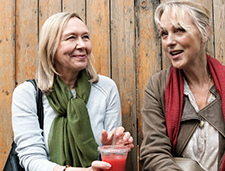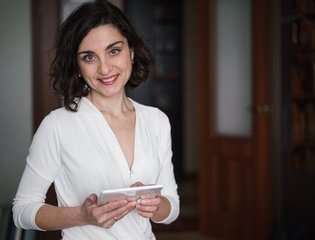Sophie: "Genetic testing means I can move through life without the worry of cancer hanging over me"
Sophie, 31, had BRCA testing through the NHS Jewish BRCA programme, and despite having no family history was shocked to find out she does carry a faulty BRCA gene.
Here she tells her story of how this led to her finding her own cancer, and how this has informed her whole family.
"I would never have thought I was at an increased risk; I don’t feel Jewish, I don’t go to synagogue but having Jewish grandparents was clearly enough for that risk to be there, even without a family history of cancer."
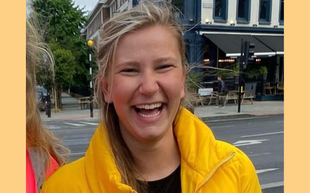
Sophie took part in the NHS Jewish BRCA programme, when it was initially launched.
My brother is a doctor, and when the NHS Jewish BRCA programme was first launched, he sent a link to order a test to our cousins' WhatsApp group so we could read about it.
We are not practising Jews, we have no family history of breast or ovarian cancer, but we do have Jewish ancestry on my mum’s side.
I’m also a Science teacher and I teach how BRCA gene faults increase cancer risk to A-level students, so it seemed to me like it would be a really interesting piece of research to be involved in and I’d be adding to a body of evidence, even with a negative result.
I ordered a test kit, and the saliva test that came in the post was so quick, easy to use. There was a little bit of a wait for results, but I wasn’t the slightest bit worried.
"I got a letter through the post telling me I have a BRCA1 mutation. I was so, so surprised.
The families I teach about when we cover BRCA at school are the typical families with lots of breast and ovarian cancer through generations, and that wasn’t us."
I knew that the BRCA1 mutation positive result meant my breast cancer risk was very high, but I wasn’t super worried about any imminent risk.
Within a week, I had a call with a genetic counsellor who was really helpful in explaining the risks of breast and ovarian cancer and my future options to me. They put me into an annual breast screening programme and informed me of the symptoms of ovarian cancer and breast cancer to look out for.
He said that at 31, with my family history, they wouldn’t recommend a preventative mastectomy quite yet.
As a result of the mutation news, I started checking my boobs, which I hadn’t been doing before, and found a lump. To start with, I ignored this as I thought it was still more likely to be nothing, but then decided I should get it looked at.
So, I went to the GP to get it checked, and was referred for a biopsy. I was sure it would be nothing.
Then, two months after my genetics result, I found out I had grade 3 triple negative breast cancer. This was an aggressive cancer but it had been caught early. This means I already had breast cancer when I went for the genetic test.
If it wasn’t for the test, I’d not have started checking my breasts and I’d not have found the lump.
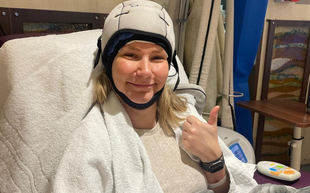
Sophie in treatment for grade 3 triple negative breast cancer.
As someone who hadn’t been to the GP for years and doesn’t like making a fuss I also think if I had found a lump without the BRCA1 result then I wouldn’t have gone to the GP.
Knowing the genetic test result saved my life. I’m now cancer-free, thanks to 8 months of chemotherapy and a double mastectomy.
My other cousin’s still hadn’t been tested and when I first got the genetics results back, my family weren’t that interested in getting tested themselves, but after my cancer diagnosis, many of them decided to take the test and in all, eight of us in my immediate family tested positive.
The knowledge has been really useful for the whole family. Not only has it saved my life but also means that we can make informed decisions that could end the impact of this gene on my family in one generation.
My mum’s had a risk-reducing oophorectomy (removal of ovaries). My cousin who tested positive is in the process of testing embryos through IVF so they can use ones that don’t carry the BRCA mutation (a process called PGT-M). My male relatives who have tested positive have also been able to make decisions about their families.
"Before the NHS Jewish testing, we didn’t know all the possibilities for cancer prevention and screening and how much can be done."
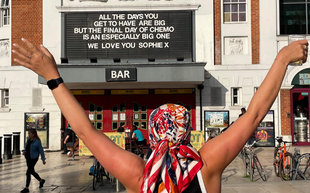
Sophie's message of support - outside the Ritzy
I am in medically-induced menopause and have decisions to make about having a family in the future. I was able to freeze my eggs before I had chemotherapy, and I know there are options, including having children using these eggs through IVF, or testing the embryos created from these.
In terms of ovarian cancer prevention, I’m interested in getting involved in the PROTECTOR trial, looking at removing fallopian tubes first, and then removing your ovaries closer to menopause.
One thing that sticks in my mind though is that I often heard the phrase “you’re too young to worry about that yet”, and I had definitely thought a lot of the related issues were for worrying about in the future.
"Having had breast cancer at 31, I am much more keen to go ahead with things I can do to prevent ovarian cancer, as I know it’s so hard to catch early and means I can move through life without the worry of that cancer hanging over me."
As soon as I’m far enough past treatment and eligible, I will go ahead with that trial. For anyone considering it, please do the testing.
People have said to me they don’t want to find out, but the actual testing doesn’t change whether you have this mutation; it just gives you knowledge. And knowledge is power.
It means you can make informed choices, even if those choices are not to do anything else at all immediately.
Me having cancer at 31 definitely wasn’t my dream scenario, but it definitely made my family sit up and take BRCA seriously.
I would never have thought I was at an increased risk; I don’t feel Jewish, I don’t go to synagogue but having Jewish grandparents was clearly enough for that risk to be there, even without a family history of cancer. And knowing about it meant I caught my cancer early and could be cured of it.
If you have Jewish ancestry, even without a family history of cancer, now is the time to act. Sophie’s story is a powerful reminder that knowledge saves lives. Her BRCA test didn’t just lead to her own early cancer diagnosis - it helped protect her entire family.
The NHS Jewish BRCA programme is free, simple, and closing soon. Register for your genetic test before the programme ends in November. Don’t wait to find out. Knowledge is power.
